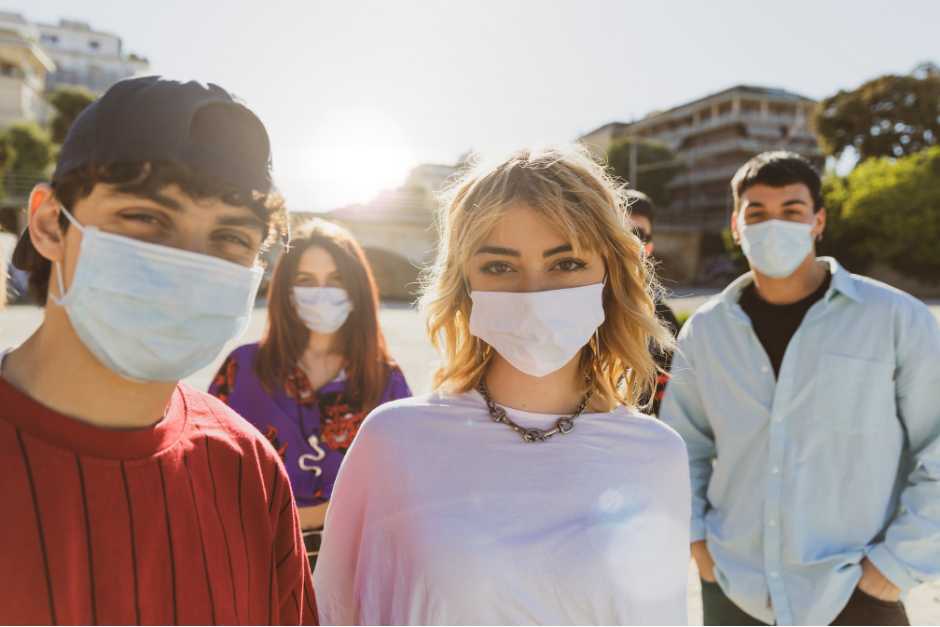As we enter our third year of pandemic life, with the omicron variant spreading across the country, one thing everyone can agree on is that we are TIRED of COVID. Although there was a brief reprieve this summer, when it appeared that we could soon stop wearing masks and social distancing, the current surge shows there is no end in sight yet.
Coping with the ongoing pandemic is challenging enough for adults. For young people, the mental health impact has been devastating. In early December, the U.S. Surgeon General Dr. Vivek Murthy issued an advisory highlighting the urgent need to address the nation’s youth mental health crisis. For more than a decade, the number of children, adolescents and young adults in the United States with mental health problems has been on the rise. However, according to the Surgeon General’s report, since the start of the pandemic, “rates of psychological distress among young people, including symptoms of anxiety, depression, and other mental health disorders, have increased.” Recent research covering 80,000 young people worldwide, found depressive and anxiety symptoms have doubled since 2019. In early 2021, emergency department visits in the United States for suspected suicide attempts were 51% higher for adolescent girls and 4% higher for adolescent boys compared to the same time period in early 2019.
Symptoms of COVID Fatigue
Now, as the pandemic is continuing, young people are also struggling with COVID fatigue. They are exhausted by the demands of life during the health crisis, such as mask-wearing and social distancing.
As parents, you may be seeing various symptoms of COVID fatigued:
- Your child may be desensitized and indifferent to COVID, feeling that it does not impact them. They don’t want to think or talk about the virus, choosing to live their life as if it didn’t exist. This is when you see a decline in compliance with health guidelines such as mask-wearing and social distancing and a willingness to engage in risky behaviors like going to parties.
- Conversely, they may feel overwhelmed by the pandemic and continuing uncertainty. Are they fearful about going out in public? Do they experience extreme anxiety when others are not taking COVID precautions? Are they isolating more than ever?
- You may be seeing heightened symptoms of depression and hopelessness. Your child may lack motivation or a sense of purpose. They may seem tired, moody and irritable. Are they putting in less of an effort at school? Have they stopped participating in activities they once enjoyed?
Coping Strategies
A recent article published by clinical psychologists at the University of California-Davis provides some helpful strategies for combating COVID fatigue that parents can encourage their adolescents and teens to work on.
- Exercise – Encourage your teen to work out, invite them to go on a walk with you. Even a little bit of exercise releases endorphins, which relieve stress and boost our sense of pleasure.
- Communicate – Let your young person know that you are there if they want to talk. Encourage them to reach out to family, friends or a professional to communicate their frustrations or anxieties. Sharing their emotions and feelings – and understanding that they are not alone in their struggles – can very effectively ease their anxiety and distress.
- Constructive thinking – Young people can be hard on themselves for feeling the way they do. Help your child adjust their thinking and be compassionate toward themselves. Remind them that they are experiencing an extraordinarily difficult situation and they are doing the best they can.
- Mindfulness – Introduce your child to mindfulness practices like breathing exercises or meditation. Encourage them to be in the moment, breath and look around at what they have. We put ourselves through a lot of unnecessary misery projecting into the future or ruminating about the past. For now, just take life day by day.
- Routine – Help your young person establish a regular routine that includes self-care, getting enough sleep, regular mealtimes and exercise. Challenge them to find things to look forward to in their routine. Even small things like a favorite TV show can help.
- Breaks – When your young person feels overwhelmed or anxious about COVID, consider limiting how much time they spend on social media or their exposure to the news. Help them take their mind off of the pandemic for a little while by distracting them with activities they enjoy.
If your adolescent or teen is expressing their COVID fatigue by not complying with health guidelines, a gentle approach is advised. As we have all seen, anger and reprimands are not helping. Being a good role model for gracefully dealing with life during COVID can be inspiring to others. If your adolescent or teen observes you coping well, they are more likely to do so as well.
If you are worried about changes in your child’s behavior, reach out for help. The mental health crisis is real and young people need our support. (Click here for a list of resources provided by the Surgeon General.)
See some of my other articles about helping young people cope with pandemic life:

